Lexi Revellian's Blog, page 19
November 26, 2011
Ups and downs of an indie writer
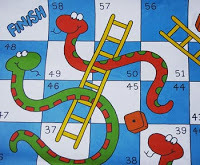
On Kindleboards I came across this post by V.J. Chambers which struck an instant chord with me. I'm sure most self-published authors will agree it's spot on about the ups and downs of an indie writer.
The good news is, that most traditionally published authors experience similar ups and downs, but the whole process is much slower, you have less control, less direct information to obsess over, and it's possible to be dumped by your publisher.
My emotional writing journey by V.J. Chambers
I loooove writing. I'm going to get published and make millions of dollars!(100 no-responses from agents later and two manuscripts later) This is really hard and demoralizing. Why do I freaking bother?Discover self-publishing is not as bad as eating babies.I loooove self-publishing. I'm going to market my butt off and play with my price and make millions of dollars!So, um, I'm not actually making any money. This is really hard and demoralizing. Why do I freaking bother?OMG! I'm selling more!OMG! I'm still selling more. If this keeps up, I could quit my day job!Oh. So, I'm, um, not really selling that many books any more. This is really hard and demoralizing. But I bother because I know that it's possible to be successful.Huh. My sales are picking up again.Huh. My sales are plummeting.So, um, apparently this writing thing is going to be emotionally draining. You can sample V.J.'s first novel in her Toil and Trouble trilogy on Amazon in the UK and US.
Published on November 26, 2011 03:57
November 19, 2011
Penguin and publishing options today
 I haven't blogged about Penguin's move into vanity publishing as it's been covered elsewhere - if you've somehow missed reading about it, I'd recommend David Gaughran's post. It's really annoying to see yet another attempt to make money out of naive wannabe writers.
I haven't blogged about Penguin's move into vanity publishing as it's been covered elsewhere - if you've somehow missed reading about it, I'd recommend David Gaughran's post. It's really annoying to see yet another attempt to make money out of naive wannabe writers.Writers, without whom there would be no books, bookshops or publishing industry (and no films for that matter) are generally treated surprisingly badly. The Big Six offer ever smaller advances and more comprehensive contracts; writers are the only people involved in publishing who mostly don't make a living wage. Anyone submitting work to agents is resigned to slow responses, form rejections or being ignored. We keep quiet about the worst horror stories (though they'd make riveting blog posts) because we want to be seen as professional.
And everyone, it seems, sees opportunities for making money out of writers thwarted by the near-impossibility of getting a legacy contract. I believe there are three sensible ways of reaching your readers today:
A traditional publishing deal. Though this is probably still most writers' dream, it's less advantageous than it was even ten years ago. Increasingly, publishing is more about marketing than the product and new or mid-list authors can feel neglected.Small press publishing deal. There are some small presses, such as Ridan, that do very well for their authors. Others, such as Night Publishing, are more like co-operatives. You need to look carefully at each one to see exactly what they offer and what their terms are, but if you are not happy going it alone this might suit you.Self-publishing. You control everything, but will need to learn how to do or commission covers, formatting, editing, proofreading and uploading to Amazon's KDP.I can see the temptation of Penguin's offer for newbie writers. After all, Penguin is one of the most famous names in the business - and for a fee they will take some of the jobs you have no idea how to do off your hands. But honestly, you can do better on your own. Trust me on this.
Published on November 19, 2011 06:39
November 12, 2011
My interview on BBC's You and Yours
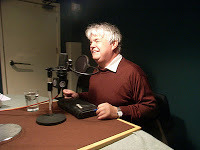 Last Friday You and Yours broadcast an item about Amazon and publishing, including a brief interview with a self-published author - me.
Last Friday You and Yours broadcast an item about Amazon and publishing, including a brief interview with a self-published author - me.A month ago, the Daily Mail Online had an article about Hive, a website set up by Gardners to 'try and stop even more independent bookshops from having to close by allowing people to buy books, e-books and DVDs online put money towards a local bookshop at the same time.' Amazon is depicted as the baddie, responsible for closing bookshops; famously nice Michael Palin supports Hive. (Not a good name, Hive - try looking it up on Google.)
I commented on the article: Like every reader, I want bookshops to flourish. But I'm also a writer, and when I looked up my novels on Hive, they are there but 'not available'. Why? Because I'm a self-published author. My books are available on Amazon. Amazon has enabled me to sell 45,000 books, mostly ebooks, over the past year. But it's virtually impossible to persuade bookshops to stock indie books, even with the full trade discount. So my loyalty remains with Amazon, and that's where I'll continue to buy books.
I was somewhat staggered to see my comment voted the least popular. But then I got a phone call from a You and Yours researcher; they were going to do a piece on Amazon, had seen my comment and wanted me to record an interview.
The BBC is only a thirty minute bike ride from Hoxton. I was taken up in a lift to the fifth floor and a small, sound-proof studio with a window into the room next door where two women controlled the sound. They asked me to keep my hands off the table so the microphone didn't pick up stray noise. Peter White came in. It's strange meeting someone you've often heard on the radio - you feel you know him, but he doesn't know you. His pleasant, relaxed demeanour made me less nervous. He asked me questions, and I remembered to keep my hands in my lap while answering. Then I biked back, thinking of all the things I might have said and didn't.
I missed the programme, as my sister was in London that Friday and I met her for lunch, so I didn't hear it until it was available on BBC iPlayer. I got several emails from friends who'd heard it by chance, and a couple from writers asking my advice. I also sold half a dozen paperbacks of Remix and Replica on Amazon.
It was an interesting experience, and I now feel more confident about doing something similar another time.
Published on November 12, 2011 04:36
November 4, 2011
Are your villains too sympathetic?
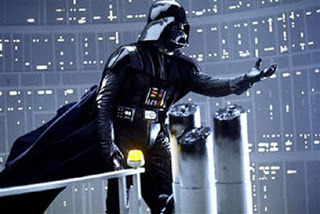 I find unremittingly evil villains boring. Take Voldemort, for instance - what does he get out of life, what motivates him? What does he do in the long winter evenings? He must, surely, get fed up with thinking up ways of being nasty to people and gaining world domination 24/7. Doesn't he ever fancy going out for a pizza and a film?
I find unremittingly evil villains boring. Take Voldemort, for instance - what does he get out of life, what motivates him? What does he do in the long winter evenings? He must, surely, get fed up with thinking up ways of being nasty to people and gaining world domination 24/7. Doesn't he ever fancy going out for a pizza and a film?I tend to err on the other side. In my first novel, Torbrek...and the Dragon Variation , the baddie Skardroft became so sympathetic I had to introduce a further baddie, Corfe, who as a torturer was hard to like. But I have to say, in the sequel, I feel sorry for Corfe as he attempts to continue his evil ways after suffering well-deserved head injuries...
There is an interesting discussion on this topic on Kindleboards. The suggestions of how to make your baddie sympathetic, but still evil, are so insightful I'm going to quote them here:
My current WIP is a fantasy, and my villain became so cool, charismatic, and *sympathetic* that he was dominating the whole story! The problem was - I think - that we had too much of his POV. We saw too much of his thoughts and related to him too strongly. I went back and either cut his POV scenes, or rewrote them from another POV. And suddenly - voilà - he became scary again. He's still a very charismatic villain, but he's clearly a villain. Sandra Miller
I always get into the heads of my villains and yes, their self-justification can be surprisingly effective. I wouldn't consider this a drawback, however. A richly drawn, slightly sympathetic villain is a wonderful detail to include in your novel. Michael Wallace
Sympathetic is fine; what is important is fear. The reader might understand and even sympathize with a villain but when that villain is in the same room as the protagonist there needs to be fear, uncertainty about what that villain might do. It's that fear and uncertainty in the heart of the reader that makes a villain effective and if the villain is also sympathetic that's even better. KM Johnson-Weider
To create a good villain, you have to be willing to completely, utterly, irrevocably damage the lives of characters you love. Otherwise, you're just having guys wave around guns with blanks instead of bullets. David Dalglish
The uncertainty has to be there. I think what I need to do now is make something happen to throw the readers the other way again. So you thought you understand this person? Think again! Several people have commented that it's best to keep the villain off-stage as well, at least initially. The monster in the shadows is scarier than the one you can see, as long as you also see the bodies strewn around. Masha DuToitI think I'm getting better at writing convincing but dislikeable villains. One reviewer commented about Sir Peter Ellis in Replica: ' the oily and cold-blooded boss is totally believable'. That'll do me.
Published on November 04, 2011 03:22
October 30, 2011
Screenplays and novel writing
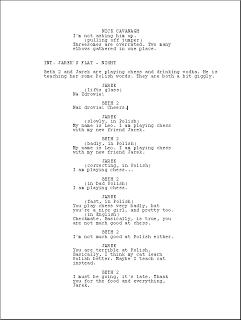 I'm currently turning my novel
Replica
into a screenplay. Why, I hear you cry - after all, if it's difficult to sell a novel which will cost a publisher £10,000 to produce (Snowbooks' figures), how much harder is it to sell a screenplay which will cost up to £500 an hour to make? (That's BBC tarifs - I couldn't find the total cost of a made-for-TV 90 minute film.)
I'm currently turning my novel
Replica
into a screenplay. Why, I hear you cry - after all, if it's difficult to sell a novel which will cost a publisher £10,000 to produce (Snowbooks' figures), how much harder is it to sell a screenplay which will cost up to £500 an hour to make? (That's BBC tarifs - I couldn't find the total cost of a made-for-TV 90 minute film.)Partly it's because I think Replica would transfer well to the small screen, and partly because it's an interesting challenge. Screenplay writing is very different from novel writing; since there will be input from the director, actors, set and costume designers, on the page it's the dialogue that does all the work. You don't say what the characters are feeling; you don't write backstory; you don't tell the actors how to deliver the lines. So the dialogue has to be very good indeed.
You lay the screenplay out to an accepted format, in Courier 12, as in the picture. This enables the length of a script to be assessed quickly. A film should come to no more than 120 pages. I'm a concise writer, so it's a new sensation for me to have to cut scenes and dialogue. I now realize why adaptations often have whole subplots missing, and why films can be so different from the original novel.
I've a nasty feeling it probably takes as long to become proficient at writing screenplays as it does to write readable novels.
Published on October 30, 2011 04:30
October 23, 2011
Cool Guys Don't Look At Explosions
I'm reading up about screenplays and how to write them at the moment, and came across this video. I love it.

Published on October 23, 2011 08:45
October 15, 2011
Harper Collins, Authonomy and ebooks
[image error]
Harper Collins sent out an email this week about its new plans for Authonomy. The site will have a new look, there will be 'improvements to forum control' (better late than never, I suppose) and Scott Pack and a team of editors will be searching the site, selecting the best novels to be digitally published by Harper Collins, one a month starting in January 2012. Those novels that sell well will be produced in a print edition. You can read about it here.
Over the course of three years, HC has shown little faith in the writers on its site, or the ranking system it put in place. It has published only two novels from Authonomy authors, and those not from the top five, a big let-down for anyone who believed the hype when it launched. Years ago, members suggested that HC should bring out POD paperbacks of the top five each month, maybe have a special stands in bookshops, promoting HC New Authors. Some books would be successful, thus financing the scheme. Possibly this idea was unrealistic.
Scott Pack's new scheme is a good one, if a year late, but then mainstream publishing moves slowly. Ebooks (in spite of publishers' protestations) are very cheap to produce; you need a cover, editing, proofreading and formatting, and you're good to go - from then on, it's all profit. The print versions of books that have proved their popularity will be risk-free.
I can see a couple of problems, though. One is that many of the best writers on Authonomy have left and self-published. Will HC want to publish books already available as ebooks? Probably not, which means they'll miss a lot of talent. The other problem, for authors, is the contract they will be offered. Publishers rely on authors' desperate longing to be 'properly' published. I somehow doubt there will be any advances. No details have been given, but I think any contract is likely to be so weighted in HC's favour that you'd need to think very carefully before signing it.
Take a look at this clause concerning a Harper Collins short story contest - and note, it covered every entry, not just the winners:
Where you submit your entry to this site...by such submission you grant UKTV and HarperCollins Publishers Limited each a perpetual, irrevocable, royalty-free, non-exclusive, worldwide, sub-licensable right and license to use, reproduce and publish, distribute and make available to the public your entry in any media, now known or later developed, for the full term of any rights that may exist in such content.
On the other hand, any big publisher has a lot of clout and ability to promote. It'll be very interesting to see how this works out.
Over the course of three years, HC has shown little faith in the writers on its site, or the ranking system it put in place. It has published only two novels from Authonomy authors, and those not from the top five, a big let-down for anyone who believed the hype when it launched. Years ago, members suggested that HC should bring out POD paperbacks of the top five each month, maybe have a special stands in bookshops, promoting HC New Authors. Some books would be successful, thus financing the scheme. Possibly this idea was unrealistic.
Scott Pack's new scheme is a good one, if a year late, but then mainstream publishing moves slowly. Ebooks (in spite of publishers' protestations) are very cheap to produce; you need a cover, editing, proofreading and formatting, and you're good to go - from then on, it's all profit. The print versions of books that have proved their popularity will be risk-free.
I can see a couple of problems, though. One is that many of the best writers on Authonomy have left and self-published. Will HC want to publish books already available as ebooks? Probably not, which means they'll miss a lot of talent. The other problem, for authors, is the contract they will be offered. Publishers rely on authors' desperate longing to be 'properly' published. I somehow doubt there will be any advances. No details have been given, but I think any contract is likely to be so weighted in HC's favour that you'd need to think very carefully before signing it.
Take a look at this clause concerning a Harper Collins short story contest - and note, it covered every entry, not just the winners:
Where you submit your entry to this site...by such submission you grant UKTV and HarperCollins Publishers Limited each a perpetual, irrevocable, royalty-free, non-exclusive, worldwide, sub-licensable right and license to use, reproduce and publish, distribute and make available to the public your entry in any media, now known or later developed, for the full term of any rights that may exist in such content.
On the other hand, any big publisher has a lot of clout and ability to promote. It'll be very interesting to see how this works out.
Published on October 15, 2011 05:58
October 8, 2011
Kindle highlights
Amazon has a new feature for Kindle users (you need to sign in). You can keep tabs on the books you are reading, have read, or stopped reading, and the notes you made on them. You can choose to make this information public.
Of course, I rushed to see if readers had highlighted anything on my books. With Remix , proudly ranking 4395th in books with Public Notes, oddly it's the first lines and my website address. With Replica , I was delighted to find this note on the thoughts of my hero, Nick Cavanagh:
Jeff shared
"She's forgiven him, when she should have spat in his eye. What were women like? Either demanding harridans, bawling you out for nothing, impossible to please, or putting up with murder and apologizing while they did it. He reckoned he was due one of the second sort."Note: So true !2 months ago
How cool is that?
Published on October 08, 2011 08:55
October 1, 2011
What are publishers thinking?
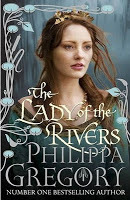
Today I noticed a novel because of the lovely colours and lettering on the cover (I take note of book covers I like, in order to work out how they were done - all part of my efforts to get on top of Adobe Photoshop 7.0).
As I write, The Lady of the Rivers , as well as being at #48 in the Amazon paper book charts, is at #82 and rising in the Kindle top 100, priced at £11.49. The paperback (not yet released) is £5.99, the hardback £6.68.
I wondered what is going through the minds of the publishers, Simon & Schuster...
Philippa Gregory has a lot of fans, many of whom will pay this outrageous price in order to get her latest book - then we can drop the price later, and pick up more sales.We don't like Amazon, and don't want to help it to do well with books for the Kindle.We don't like ebooks - we'd really rather they went away; if we make them more expensive than paper books, maybe people will buy those instead.And if they DO buy the ebook at this price, what a lot of money we'll make. After all, we're only paying Philippa and her agent 17.5% of the price, and it's costing us nothing at point of sale. No paper, printing, delivery, storage, returns. Ho ho ho.But what about piracy? If the book isn't available for free illegal download now, it certainly will be in a day or two. And if anything is going to make normally law-abiding readers download a copy from pirate sites and get into the habit of so doing, this sort of rip-off pricing will.
Published on October 01, 2011 14:03
September 28, 2011
Publishers to get stranglehold on Amazon Kindle sales?
 I think Stephen Leather is right (see my last post, Sunset or sunrise on the Indie Summer). The Indie Summer may be over. What made me come to this conclusion, apart from my own drop in sales? This article in The Bookseller, Amazon readying October Kindle offer. Let me quote:
I think Stephen Leather is right (see my last post, Sunset or sunrise on the Indie Summer). The Indie Summer may be over. What made me come to this conclusion, apart from my own drop in sales? This article in The Bookseller, Amazon readying October Kindle offer. Let me quote:Amazon.co.uk has asked publishers for discounts of 90% on titles in order to participate in an October Kindle promotion.
The campaign is due to run from 17th to 31st October inclusively. Amazon has told publishers this will be the "main focus for our merchandising efforts during this period", and would be supported with emails, on Facebook, and via Twitter. It has asked for new frontlist as well as key backlist titles.
Of course, publishers are grumbling about this - they hate to reduce their prices, and have spent the last year coming up with specious arguments as to why an e-book should cost as much as a paperback, in spite of savings on paper, print, transport, storage and the pulping of remaindered books. But I'll bet they were pleasantly surprised by the profits they made during Amazon's Twelve Days of Kindle, Spring Spectacular and Summer Sale. Amazon wants to encourage them to produce more and better products (many mainstream books' formatting is poor) at a lower price.
At the start of this year, along with other self-published books, Remix was featured on Amazon's promotional pages. This gave it a huge boost. The same hasn't happened with Replica , nor have I noticed any other indie books being promoted recently. This may be because there are now many more trad published books available. And the algorithm tweaks, which made rankings less 'sticky' and changed the recommendation system have hit our sales particularly, as we don't have the marketing opportunities big publishers do.
It's not a conspiracy. I don't think Amazon has anything against self-published books. Amazon constantly seeks ways to improve its selling and profit, and indie sales are just collateral damage. But it's kind of depressing to suspect that within another year, big publishers will have established the same stranglehold over digital that they have always enjoyed over print.
Once more, the authors they reject will have no way of reaching readers, and readers will not have access to some books they would have loved.
I do hope I am wrong about this.
Published on September 28, 2011 04:04



